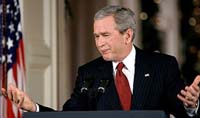Bush urges Congress to give Iraq policy a chance, but Democrats aren't buying it
President George W. Bush's push for a new immigration policy and his acknowledgment of global climate change as a serious concern won praise from presidential candidates in both parties Wednesday even as they split on partisan lines over Iraq.

Bush appealed to Congress in his State of the Union speech to give his Iraq strategy a chance to work, running into a wall of skepticism, especially from Democrats who control the House and Senate.
That response carried over into the television talk shows, where Democratic presidential aspirants Barack Obama and Bill Richardson voiced firm opposition to Bush's troop escalation. "He has not made the case," Obama, a senator, said on CBS television's "The Early Show."
Two Republican presidential hopefuls Sen. John McCain and former New York Mayor Rudy Giuliani _ countered that there is no choice but to give Bush's plan a chance to succeed. "It's the only game in town," McCain said on the same program.
Giuliani, on NBC television's "Today" show, said: "I believe we should give the president the support to do this."
Bush also urged lawmakers in his speech Tuesday night to send him legislation helping more Americans afford health insurance, reduce U.S. dependence on foreign oil, overhaul immigration laws and renew his signature No Child Left Behind education program. He declared climate change a "serious challenge" but did not endorse proposals for mandatory reductions of greenhouse gas emissions.
"The idea of climate change finally passed his lips," Obama said. "That's long overdue."
McCain also welcomed Bush's acknowledgment, while saying "of course" the U.S. needs to go farther than Bush has proposed on the issue. "We've got to start reducing these greenhouse gas emissions before our planet is unalterably heated, and the consequences of that are catastrophic," he said on CNN.
Richardson, a former U.N. ambassador and governor of the state of New Mexico, predicted Bush and the Democratic Congress will be able to work together on a comprehensive plan to control illegal immigration. McCain agreed: "We can come together on that issue."
Bush arranged a trip to nearby Wilmington, Delaware, on Wednesday to plug his energy proposals at a DuPont Co. facility where scientists conduct research on the use of plants in the production of biofuels such as celluosic ethanol.
But Democrats kept the spotlight on the war, as the Senate Foreign Relations Committee took up a nonbinding measure that rejects Bush's planned troop increase as "not in the national interest of the United States."
As is customary, Republicans cheered longer and louder than Democrats on Tuesday night when Bush walked down the middle aisle of the chamber of the House of Representatives to deliver his annual address to Congress and the nation.
But it was the Democrats' turn to whoop it up when the president remarked he was the first chief executive to "begin the State of the Union with the words Madam Speaker." Rep. Nancy Pelosi, the first female House leader, was seated next to Vice President Dick Cheney on the dais behind the president, and smiled and reached down to shake Bush's hand.
In power for the first time in a dozen years, Democrats have talked optimistically of finding common ground with the president and Republican lawmakers on immigration, education and other areas.
But they voiced concern with his proposal to subject a portion of some taxpayers' employer-provided health insurance to taxes, and were unenthusiastic about his proposals on energy, reports AP.
"For me, the president's speech was more notable for what he didn't say on global warming than what he did say," said Sen. Barbara Boxer. The California Democrat advocates steps to halt the gradual rise in the earth's temperature.
The president called for greater domestic oil production as well as an effort to more than quadruple U.S. production of alternative fuels over the next decade.
The war is an issue apart a conflict that helped Democrats win control of Congress in last fall's elections, and that leaves Republicans torn between a president of their party on the one hand and public opinion on the other.
Subscribe to Pravda.Ru Telegram channel, Facebook, RSS!


